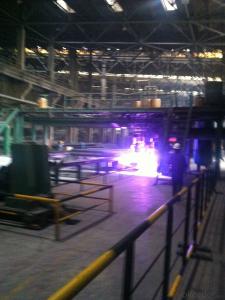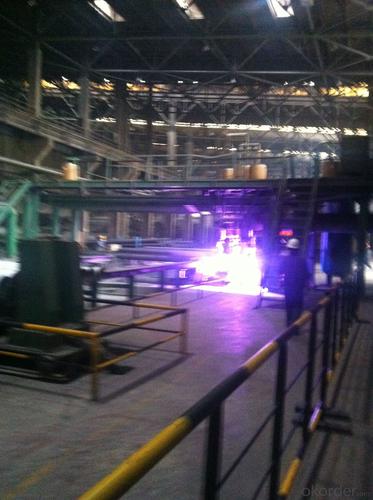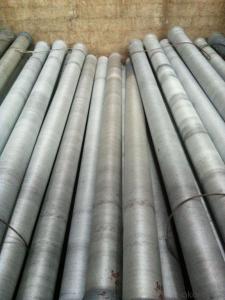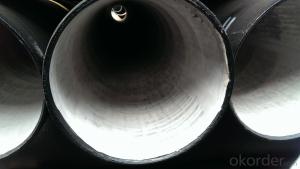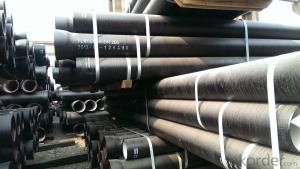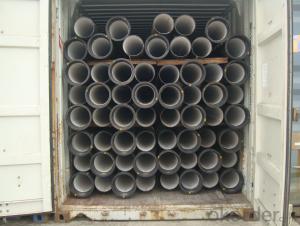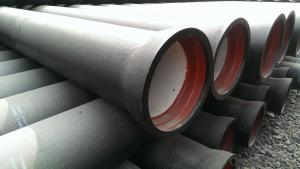DUCTILE IRON PIPES AND PIPE FITTINGS K7 DN900
- Loading Port:
- Tianjin
- Payment Terms:
- TT OR LC
- Min Order Qty:
- 25 pc
- Supply Capability:
- 30000 pc/month
OKorder Service Pledge
OKorder Financial Service
You Might Also Like
Material : Ductile Cast Iron
Size Range : DN 80mm to DN 2000mm
Unit Effective Length : 6m or 5.7m
Manufacture Standard: ISO 2531:1998/ EN 545:2006/EN 598:2007
Annual capacity : 200,000 tons
Coating Exterior: Zinc 130g/m2 according to ISO 8179-1 and bitumen coating 70 microns.
Cement Interior: Portland Cement/ High Alumina Cement/ Sulphate Resisting Cement Lining according to ISO 4179
Special requirements on external coating and internal lining can be applied
We also provide accessories such as SBR/EPDM rubber gaskets, lubricant paste, pipe caps, PE sleeves, etc.
Additional Parts:
Each pipe is strictly inspected according to related standard to ensure permanently high performance.
Easy Installation at site and service free for life
Long Service Lifespan
Quotation will arrive you within 24hours once we get your inquiry.
We guarantee offering you a competitive price.
A copy of original inspection reports of pipes will be offered after shipment.
Photos of loading process will be sent to the customer after shipment effect.
We will follow-up the delivery progress after shipment effect and update to the customer on weekly basis.
- Q: Can ductile iron be welded? Is weldability comparable to gray iron?
- Suitable for the full range of cold welding welding, welding cast iron base material can almost all, and it is easy to achieve cast iron and carbon steel dissimilar metal welding, such as solving matrix fracture, crack, wear, hole filling defects after welding can be machined, many applications in the engine casing, cylinder head, casting machine, gear base the tooth of iron castings.
- Q: Are ductile iron pipes suitable for installation in areas with high seismic activity?
- Ductile iron pipes are a suitable choice for installation in areas with high seismic activity. One of the key advantages of ductile iron pipes is their ability to withstand external loads and ground movement, making them ideal for seismic zones. Ductile iron pipes have excellent flexibility and high tensile strength, allowing them to withstand ground shifting and seismic forces without breaking or fracturing. Additionally, their high resistance to impact and stress make them less susceptible to damage during seismic events. Furthermore, ductile iron pipes have a proven track record of performance in seismic areas, as they have been successfully installed and used in earthquake-prone regions around the world for many years. They have demonstrated their ability to withstand the ground movements caused by seismic activity without compromising their structural integrity. Moreover, ductile iron pipes have the advantage of being highly durable and long-lasting, which is crucial in areas with high seismic activity where infrastructure needs to withstand frequent ground movements. Their longevity reduces the need for frequent maintenance and replacement, making them a cost-effective option in the long run. However, it is important to note that proper installation techniques and adherence to seismic design guidelines are essential to ensure the optimal performance of ductile iron pipes in high seismic areas. It is recommended to consult with experienced engineers and follow local building codes and regulations to ensure the pipes are installed correctly and can withstand the specific seismic conditions of the area. Overall, due to their flexibility, strength, durability, and proven performance, ductile iron pipes are considered suitable for installation in areas with high seismic activity.
- Q: Can ductile iron pipe be used for pressure sewer systems?
- Yes, ductile iron pipe can be used for pressure sewer systems.
- Q: Can ductile iron pipes be used for trench crossings?
- Yes, ductile iron pipes can be used for trench crossings. Ductile iron pipes are known for their high strength and durability, making them suitable for various applications including trench crossings. They have the ability to withstand heavy loads and provide increased resistance to external forces, making them a reliable choice for such purposes.
- Q: How does ductile iron pipe perform in seismic areas?
- Ductile iron pipe performs exceptionally well in seismic areas due to its inherent strength and flexibility. Seismic activity can subject pipelines to significant ground movements and vibrations, and ductile iron pipes have proven to be highly resilient in such conditions. The unique properties of ductile iron, including its high tensile strength and ductility, allow it to absorb the energy generated during seismic events. This ability to flex and bend without breaking or fracturing makes it an excellent choice for areas prone to earthquakes. Furthermore, ductile iron pipes are designed and manufactured to withstand external forces and ground movements. They are often installed with flexible joints that can accommodate ground shifts and maintain the integrity of the pipeline system. These joints can absorb lateral and angular movements, reducing the risk of pipe failure. Additionally, ductile iron pipes have a long history of successful performance in seismic areas. They have been extensively tested and proven to meet or exceed industry standards for seismic resistance. This reliability is crucial in ensuring the safety and functionality of water and wastewater systems, even in the event of a seismic event. Overall, ductile iron pipe is a reliable and durable choice for pipelines in seismic areas. Its ability to withstand ground movements, its flexibility, and its proven track record make it an excellent option for ensuring the integrity and functionality of water and wastewater systems in earthquake-prone regions.
- Q: How can 4 inch ductile iron pipe be connected with 2 inch galvanized pipe?
- The general electric welded steel pipe for clarinet.
- Q: How does ductile iron pipe perform in areas with high groundwater salinity?
- Ductile iron pipe performs well in areas with high groundwater salinity due to its corrosion resistance properties. The iron pipe is coated with a protective layer that prevents corrosion and extends its lifespan, even in saline environments.
- Q: What is the expected surge pressure rating of ductile iron pipes?
- The surge pressure rating for ductile iron pipes can vary based on several factors, including pipe diameter, thickness, joint type, and manufacturer specifications. Generally, ductile iron pipes are built to withstand surge pressures ranging from 150% to 200% of their working pressure rating. For instance, if a ductile iron pipe has a working pressure rating of 250 psi, it can typically handle surge pressures of 375 psi to 500 psi. To obtain accurate surge pressure ratings for the specific ductile iron pipes being used, it is crucial to refer to the manufacturer's specifications and guidelines.
- Q: How are ductile iron pipes made?
- Ductile iron pipes are made using a specific manufacturing process known as centrifugal casting. This process involves pouring molten iron into a rotating mold, which is usually made of steel. The centrifugal force created by the rotation of the mold helps in distributing the molten iron evenly, ensuring the final product is of high quality. To begin the manufacturing process, a mixture of scrap iron, steel, and recycled material is melted in a furnace at extremely high temperatures. Once the molten iron reaches the desired temperature and consistency, it is ready to be cast into pipes. The rotating mold is first preheated to prevent the molten iron from cooling too quickly. The preheating process also helps in ensuring a smooth surface finish of the pipes. Next, the molten iron is poured into the rotating mold through a central sprue. As the mold spins, the molten iron is forced against the inner walls of the mold due to centrifugal force. This causes the iron to solidify rapidly, resulting in a dense, strong, and corrosion-resistant pipe. The centrifugal force also helps to remove any impurities or slag from the inner surface of the pipe, further enhancing its quality. Once the casting process is complete, the mold is allowed to cool, and the pipe is removed. The pipes are then subjected to various tests to ensure they meet the required quality standards. These tests may include checking the dimensions, mechanical properties, and surface finish of the pipes. After passing the quality tests, the ductile iron pipes are typically coated with a protective lining to prevent corrosion and extend their lifespan. This lining can be made of cement mortar, epoxy, or polyethylene, depending on the intended application of the pipes. In summary, ductile iron pipes are made through the centrifugal casting process, which involves pouring molten iron into a rotating mold. This process ensures the production of strong, corrosion-resistant pipes with a smooth surface finish.
- Q: Can ductile iron pipes be used in mining applications?
- Yes, ductile iron pipes can be used in mining applications. Ductile iron is known for its high strength and durability, making it suitable for use in demanding environments such as mines. These pipes have excellent resistance to corrosion, which is essential when dealing with water or other liquids that may contain chemicals or minerals. Additionally, ductile iron pipes have good impact resistance, making them capable of withstanding the rough conditions often found in mining operations. They are also easy to install and maintain, allowing for efficient and cost-effective use in mining applications. Overall, ductile iron pipes are a reliable choice for transporting water, slurry, or other substances in mining operations.
Send your message to us
DUCTILE IRON PIPES AND PIPE FITTINGS K7 DN900
- Loading Port:
- Tianjin
- Payment Terms:
- TT OR LC
- Min Order Qty:
- 25 pc
- Supply Capability:
- 30000 pc/month
OKorder Service Pledge
OKorder Financial Service
Similar products
Hot products
Hot Searches
Related keywords
